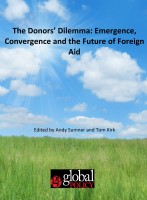The Donors’ Dilemma: Emergence, Convergence and the Future of Foreign Aid by Global Policy
>> Tuesday, August 5, 2014

This is the question addressed by contributors to Global Policy’s first e-book entitled ‘The Donors’ Dilemma: Emergence, Convergence and the Future of Aid', guest edited by Dr Andy Sumner, Co-Director, King’s International Development Institute, King’s College London, and Tom Kirk, Researcher at the London School of Economics and Political Science.
INTRODUCTION
Andy Sumner - The Donors’ Dilemma: Emergence, Convergence and the Future of Foreign Aid
SECTION I - NEW APPROACHES: FROM TRADITIONAL AID TO GLOBAL PUBLIC GOODS
1. Nancy Birdsall - The Future of Aid: 2030 ODA No More
2. Myles Wickstead - The Future of Aid and Beyond
3. Jonathan Glennie - A Manifesto for International Public Finance in the 21st Century
4. Inge Kaul - Time to Think in Terms of Global Public Policy
5. José Antonio Alonso - From ODA to a Global Development Policy
6. David Ritter and Jessica Panegyres - Climate Change and the Future of Aid
7. Asuncion Lera St. Clair - Transforming Development Aid
SECTION II - NEW OBJECTIVES: FROM POVERTY REDUCTION TO EQUITABLE DEVELOPMENT
8. Erik Solheim - The Age of Equality
9. Duncan Green - Shifting the Focus to Knowledge, Inequality and Universal Challenges
10. Ravi Kanbur - Resetting IDA’s Graduation Policy
11. Tony Addison and Finn Tarp - Aid and Growth in Africa
12. Vivan Sharan - Traditional Aid Has No Future: Markets and India’s Lines of Credit
13. Jason Hickel- Aid in Reverse: How Poor Countries Develop Rich
SECTION III - NEW MOTIVATIONS: FROM POST-COLONIAL CHARITY TO DEVELOPMENT COOPERATION AS FAIRER GLOBAL GOVERNANCE
14. David Held and Kyle McNally - Globalisation and Development
15. Dhananjayan Sriskandarajah - From Charity to Social Justice
16. Thomas Pogge - Addressing the Structural Roots of Persistent Underdevelopment
17. John Podesta - Beyond Zero Sum
18. Linah K. Mohohlo - A Change in Mindset is needed if Aid is to Remain Relevant
19. Karl Muth - Aid Circa 2032: Three Players, No Winners
SECTION IV - NEW WAYS OF WORKING: FROM ALLOCATING MONEY TO WORKING CATALYTICALLY
20. Simon Maxwell - What is the future of International Development?
21. Ben Ramalingam - Aid on the Edge of Chaos: Rethinking international cooperation in a complex world
22. Edward R. Carr - The Future is Already Being Fed
23. Shanta Devarajan - Aid as Disruption
24. Andy Sumner – Did global poverty just fall a lot, quite a bit or not at all?
CONCLUSION
25. Andy Sumner and Tom Kirk - The Donors’ Dilemma: A wrap up of the debate
Global Policy is an innovative and interdisciplinary journal bringing together world class academics and leading practitioners to analyse both public and private solutions to global problems and issues. It focuses on understanding globally relevant risks and collective action problems; policy challenges that have global impact; and competing and converging discourses about global risks and policy responses. It also includes case studies of policy with clear lessons for other countries and regions; how policy responses, politics and institutions interrelate at the global level; and the conceptual, theoretical and methodological innovations needed to explain and develop policy in these areas.
Global Policy will be invaluable to those working in economics, global politics, government, international law, international relations, international political economy, and many other disciplines that contribute to developing global policy. The journal is also designed to inform and engage senior policymakers, private and public corporations, non-governmental organisations, and international bodies. The overall objective is to stimulate deep policy learning, relevant for the academy and for governments and key non-governmental players.
Global Policy's Editorial Board comprises a distinguished panel of academics who are supported by an International Advisory Board and a Practitioners' Advisory Board of experts from around the world to ensure the focus remains on pressing and relevant global issues. Global Policy is based at Durham University
Price: $2.99 USD
First 10% Sample: epub | mobi (Kindle) | lrf




0 comments:
Post a Comment